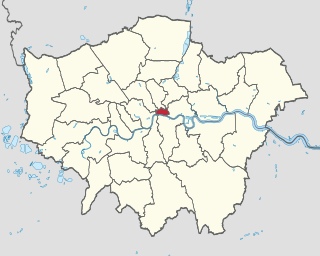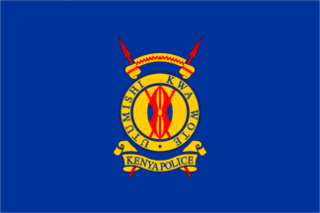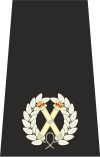Sergeant is a rank in use by the armed forces of many countries. It is also a police rank in some police services. The alternative spelling, serjeant, is used in The Rifles and other units that draw their heritage from the British light infantry. Its origin is the Latin serviens, 'one who serves', through the Old French term serjant.
Commander is a common naval officer rank as well as a job title in many armies. Commander is also used as a rank or title in other formal organizations, including several police forces. In several countries this naval rank is termed frigate captain.

The City of London Police is the territorial police force responsible for law enforcement within the City of London, England, including the Middle and Inner Temples. The force responsible for law enforcement within the remainder of the London region, outside the city, is the much larger Metropolitan Police, a separate organisation. The City of London, which is now primarily a financial business district with a small resident population but a large commuting workforce, is the historic core of London, and has an administrative history distinct from that of the rest of the metropolis, of which its separate police force is one manifestation.

The Commissioner of Police of the Metropolis is the head of London's Metropolitan Police Service. Sir Mark Rowley was appointed to the post on 8 July 2022 after Dame Cressida Dick announced her resignation in February 2022.
Chief Constable is the rank used by the chief police officer of every territorial police force in the United Kingdom except for the City of London Police and the Metropolitan Police, as well as the chief officers of the three 'special' national police forces, the British Transport Police, Ministry of Defence Police, and Civil Nuclear Constabulary. The title is also held by the chief officers of the principal Crown Dependency police forces and the Sovereign Base Areas Police in Cyprus. The title was also held, ex officio, by the president of the Association of Chief Police Officers under the Police Reform Act 2002. It was also the title of the chief officer of the Royal Parks Constabulary until this agency was disbanded in 2004.
Police ranks are a system of hierarchical relationships in police organisations. The rank system defines authority and responsibility in a police organisation, and affects the culture within the police force. Usually, uniforms denote the bearer's rank by particular insignia affixed to the uniforms.
Chief Superintendent is a senior rank in police forces, especially in those organised on the British model.
Police commissioner is a senior rank in many police forces of the world. In other jurisdictions, it is the title of a member of an oversight board.

The Gibraltar Defence Police (GDP) is a civil police force which provides a policing and security service for the Ministry of Defence in Gibraltar. Prior to 17 December 2009 it was known as the Gibraltar Services Police (GSP).
Deputy assistant commissioner (DAC), formally Deputy Assistant Commissioner of Police of the Metropolis, is a rank in London's Metropolitan Police Service between assistant commissioner and commander. It is equivalent to deputy chief constable in other British police forces and wears the same insignia: a pip above crossed tipstaves within a wreath.
Assistant superintendent, or assistant superintendent of police (ASP), is a rank that was used by police forces in the British Empire and is still used in many police forces in the Commonwealth. It was usually the lowest rank that could be held by a European officer, most of whom joined the police at this rank. In the 20th century, it was in many territories opened to non-Europeans as well.
Deputy chief constable (DCC) is the second highest rank in all territorial police forces in the United Kingdom. The British Transport Police, Ministry of Defence Police, Civil Nuclear Constabulary, and the Isle of Man Constabulary each also has a DCC.

Staffordshire Police is the territorial police force responsible for policing Staffordshire and Stoke-on-Trent in the West Midlands of England. It is made up of 11 local policing teams, whose boundaries are matched to the nine local authorities within Staffordshire.

North Yorkshire Police is the territorial police force covering the unitary authorities of North Yorkshire and the City of York in northern England. As of September 2018 the force had a strength of 1,357 police officers, 127 special constables, 192 PCSOs and 1,072 police staff. Of the 43 territorial police forces in England and Wales, the force has the 3rd largest geographic area of responsibility whilst being the 15th smallest force in terms of police officer numbers.
Superintendent (Supt) is a rank in the British police and in most English-speaking Commonwealth nations. In many Commonwealth countries, the full version is superintendent of police (SP). The rank is also used in most British Overseas Territories and in many former British colonies. In some countries, such as Italy, the rank of superintendent is a low rank.

The Kenya Police Service is a national body in charge of law enforcement in Kenya. It is subordinate to National Police Service which is headed by Inspector General of Police who exercises independent command over the Service. Kenya Police is headed by Deputy Inspector General. Kenya Police is divided into Service Headquarters in Nairobi, Formations, General Duty Commands and Training Institutions.
Assistant commissioner or assistant commissioner of police (ACP) is a rank used in various police forces.

General is a four-star general officer rank in the Indian Army. It is the highest active rank in the Indian Army. General ranks above the three-star rank of lieutenant general and below the five-star rank of field marshal, which is largely a war-time or ceremonial rank.
The police in Canada's ranks differ according to the different police forces and depend on different laws at the federal, provincial, and municipal levels.







